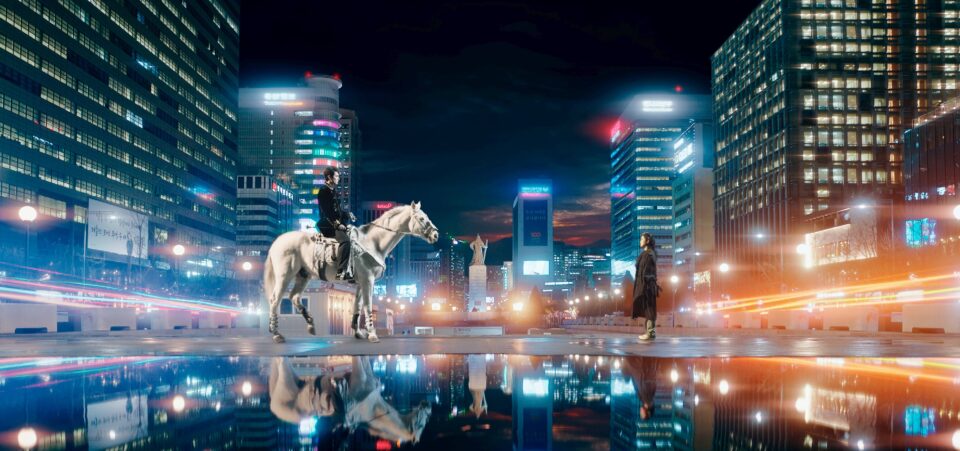The Growing Appeal of Fantasy K-Dramas
The way we see these dramas depends on their arcs and characters, so fully realized that aspects of fantasy are seldom challenged

Due to its romanticism and optimism-based roots, K-fantasy’s appeal strikes in a unique vein. They specialize in worldbuilding—creating imagined spaces. 'The King: Eternal Monarch,' a whirling chronicle of two parallel universes, is an analogous instance. Photo courtesy of SBS TV.
A fantasy K-drama, albeit exceedingly implausible, may provide a refreshing break from mundane routine for an engaging viewing experience. Its artful narration, when combined with the surreal or similar elements as a central theme, or subject, could make the context look real. And it is the most profound thrill of all: to look forward to the inconceivable. The way we see these dramas depends on their arcs and characters, so fully realized that aspects of fantasy are seldom challenged.
They specialize in worldbuilding—creating imagined spaces. The King: Eternal Monarch (2020), a whirling chronicle of two parallel universes, is an analogous instance. As he enters the Republic of Korea (in a parallel reality), we witness King Lee Gon (Lee Min-ho) of the Kingdom of Corea facing Cop Jeong Tae-eul (Kim Go-eun), whom he recognizes with an ID card he had when his father was slain. On the other side, the assassin of Lee Ho (Lee Gon’s father)—Lee Rim (Lee Jung-jin), Lee Gon’s half-uncle—is rallying troops covertly while navigating the two divergent realms.
This drama is notable for creating a fictional setting with cogent characteristics—its past, present, and environment—in the kingdom of Corea. A far cry from the usual, its depiction of alternate spaces, times, and hypotheses indeed piques the imagination. It’s a brainteaser and incredibly unlikely in totality, but everything comes together in the epilogue. Ignoring some conflicting reviews and the flak it received for reportedly a few historical blunders, awe-inspiring performances, precise film craft, and a hypnotic OST lavishly highlight The King—a fantasy that fuels its great attraction as a magnificent retreat for the viewers.
Due to its romanticism and optimism-based roots, K-fantasy’s appeal strikes in a unique vein. Let’s rehash three cult favorite K-dramas in a comparable light: My Love from the Star (2013), The Legend of the Blue Sea (2016), and Guardian: The Lonely and Great God (2016).
Do Min-joon swooped through the stars, sweeping Cheon Song-yi off her feet in a heart-fluttering My Love from the Star, pulsing with romance, enigma, and splendor. The top-notch cast magnetizes thanks to their efficiency, notably Kim Soo-hyun and Jun Ji-hyun, as Do and Cheon. While Kim’s unblemished portrayal meets the mood of the show, Jun speaks with her starry façade and all-vulnerable heart, pining for love.
The series centers on a superpowered alien, Do, who was inadvertently stranded on Earth and shocked to find Hallyu star Cheon living next door. He repeatedly steps into her distressed life to save her, with only three months until his return to his own. When reality dawns, a unique experience evolves, and love seeps in. The drama’s take on the scenario is nuanced enough for simple comprehension. Originality and execution led to its global success, while also contributing to the expansion of the Hallyu wave.
The Legend of the Blue Sea’s marked enchantment is built on hope, the fantasy aside; it unmistakably offers catharsis, a coping strategy questioning the viability of a Joseon-era mermaid in contemporary Seoul. Indeed, it’s a singular narrative, perhaps unlike any other I continue to reflect on. My tryst with it also stems from the romance of Heo Joon-jae (Lee Min-ho), a conman, and Shim Cheong (Jun Ji-hyun), the mermaid. Based on myth, unrequited love, and rebirth, the plot is ingeniously stitched in with flashbacks of their Joseon-era identities, Se Hwa (the mermaid), and Kim Dam-ryeong (the town chief). Lee and Jun’s consuming rapport headlined with Jun gaining added notoriety as the mystical mermaid.
Living calls for fantasy. Even if it lets us escape from reality, it also necessarily aids in understanding it. A fantasy K-drama’s core value is faith. Its making is such that, through its fundamental concepts and ramifications, it motivates. Guardian: The Lonely and Great God can be the case here. When I watch a show like that, I enjoy its mysticism, mystery, and romance, of course. Here, an eternal goblin (Gong Yoo) seeks his bride (Kim Go-eun), the only individual who can pull out an invisible sword that’s piercing his chest. It’s a flight of fancy—a brilliant one at that—with this beautiful message underneath: a profound desire, endurance, and faith above all lead to what we’re looking for, and that love is all-encompassing; it can move mountains.
Over the years, the renown of fantasy K-dramas has surged, resulting in the release of countless comparable superhits—from the earlier ones, like My Girlfriend is a Gumiho (2010), Secret Garden (2010), Master’s Sun (2013), Moon Lovers: Scarlet Heart Ryeo (2016), W (2016), Strong Girl Do Bong-soon (2017), Hotel Del Luna (2019), He is Psychometric (2019), and Extraordinary You (2019), to the later offerings, like Tale of the Nine-Tailed (2020), The Uncanny Encounter (2020), Doom at Your Service (2021), My Roommate Is a Gumiho (2021), Alchemy of Souls (2022), Tale of Nine-Tailed 1938 (2023), the ongoing See You in My 19th Life (2023), and more such titles. Some upcoming titles include Destined with You, A Time Called You, and various others that are highly anticipated.
To cut to the chase, these fictional tales provide a world in which we can explore what’s beyond the boundaries of reality. It’s an inviting universe of make-believe. We like its utopia, where the possibilities that you and I imagine are realized. And who knows, some of it might come to pass at some point; after all, the most revolutionary realities were made possible by the most unfathomable imaginations.



